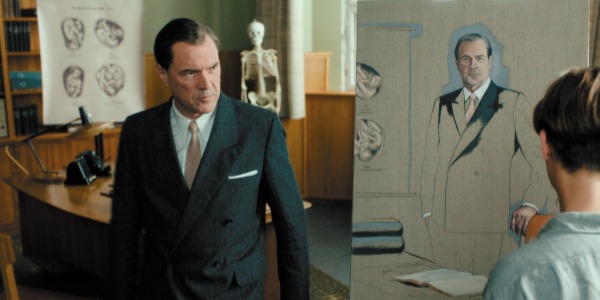NEVER LOOK AWAY: It’s Hard Not To

Alistair is a 25 year old writer based in Cambridge.…
Picture the scene: you’re a filmmaker whose debut film has broken out on the international stage, even picking up an Oscar for your hard work on a project that had been a labour of love for many years. You’ve now made a name for yourself, and can choose any project, either in your native country or over in Hollywood, as your sophomore feature.
For Florian Henckel von Donnersmarck, he abandoned the dark drama he was planning as his follow up to The Lives of Others in order to go to Hollywood – and the result, 2010’s The Tourist, was the rare case of a multi-Golden Globe nominated, financially successful film that still managed to get him thrown into director jail.
A Director Back In His Comfort Zone – For Better Or Worse
Nearly a decade later, he’s returned to Germany with a third film that has seen him fall back into the good graces of the Academy. After self consciously choosing a lighter project for his sophomore feature, Never Look Away feels like a deliberate attempt to pull himself back into his Lives of Others comfort zone. But this is precisely what acts to the film’s detriment; even though he’s analysing the fallout of an earlier moment in German history, it can’t help but feel like a watered down variant on the same formula, not least due to the fact both feature characters played by Sebastian Koch who have to hide their affinity for an ideology outlawed by the state.
The first hour of the needlessly long 190 minute feature offers a promising start. During Nazi rule, young Kurt Barnert (played by Cai Cohrs as a child and Tom Schilling as an adult) develops an interest in art thanks to his aunt’s influence. Around the same period, her irrational behaviour is brought to the attention of the authorities, leading to her getting forcibly sterilised and sent to her death in a concentration camp. The gynaecologist responsible, Professor Carl Seeband (Sebastian Koch), has his record scrubbed after the fall of the third reich, but as he transitions into espousing the communist idealism of East Germany, he still secretly believes in the forced sterilisation of those with inferior genetics.

During the 1950’s, Kurt meets Ellie (Paula Beer) while studying art in East Germany – her father is Professor Seeband, and over the years, Kurt slowly begins to discover he is the man responsible for his aunt’s death, one of the main reasons he studied art in the first place. Seeband goes to vile lengths to keep the pair apart, at one point even advocating for rupturing her womb so she cannot carry a child by somebody he views as genetically inferior, but this doesn’t tear the pair apart. He flees to West Germany, worried that his true identity is to be revealed, with Kurt and Ellie following so Kurt can pursue an art career in the more welcoming western world.
On paper, it’s hard to deny that this narrative (loosely based on the life of German painter Gerhard Richter) sounds ripe for a gripping examination of how the monsters responsible for despicable crimes against humanity transitioned to normality with the rest of society, even as their abhorrent views continued to bubble under the surface. And for the majority of the film’s first half, it largely makes good on this promise, effectively contrasting the hopes of a new generation newly free from fascism with the evil men who only prospered when they could inflict suffering on others.
There may be little nuance to the characterisation of the antagonist, but that is precisely the point. As many “good people” (teachers and other public servants) lost their jobs following the war due to the fact they’d previously signed a charter aligning themselves with an ideology they didn’t believe in, the most evil men adapted by hiding their records and offering the appearance of having swiftly changed their personal views.
Tortured Artist Tedium
But eventually, this takes a back seat to the far less engaging trials and tribulations of the young artist, trying to reconcile his personal demons into a form of artistic expression increasingly concerned with political commentary. This isn’t a particularly unique theme – the raison d’être for why people become artists is inherent within any biopic of a creative person, and it isn’t exactly uncommon for this to be coupled with a contrast between the popular works of the era, and why their work appeared out of time in comparison. But when stretched to a gargantuan running time, with the intrigue of the post-war character study firmly placed in the backseat, Never Look Away increasingly becomes a chore to sit through.

By the film’s final hour, it feels like Henckel von Donnersmarck is increasingly trying to depict only the minutiae of a struggling artist’s life, with more scenes of casual sex and montages of Kurt at his janitorial day job than anything of immediate thematic interest. It’s hard to escape the nagging sense that he’s confused an epic length as something suggesting inherent importance, even as the story he’s telling doesn’t fit on such a grand canvas, even as it moves from decade to decade in a turbulent period in Germany’s history.
Although The Lives of Others was a highly regarded film, many never forgave it for robbing Pan’s Labyrinth of the foreign language film Oscar. But at least that win was justified by the strength of what he made – I’m completely at a loss as to why a film as middle of the road as his latest managed to rob Lee Chang Dong’s Burning of a space in the foreign language nominations lineup. It’s the sight of a director getting back in their comfort zone after a major misstep, but getting far too comfortable in that space, ruminating on themes they find interesting while struggling to convey why they should be of wider audience fascination.
Never Look Away: Conclusion
Far inferior to The Lives of Others but competent enough to warrant the comeback label, Never Look Away shows signs of promise, but is let down by an epic scale that is never justified. By the boring final hour, it will become very easy to break the titular rule.
Never Look Away was released in the US in December 2018, and will be released in the UK on July 5, 2019.
Does content like this matter to you?
Become a Member and support film journalism. Unlock access to all of Film Inquiry`s great articles. Join a community of like-minded readers who are passionate about cinema - get access to our private members Network, give back to independent filmmakers, and more.
Alistair is a 25 year old writer based in Cambridge. He has been writing about film since the start of 2014, and in addition to Film Inquiry, regularly contributes to Gay Essential and The Digital Fix, with additional bylines in Film Stories, the BFI and Vague Visages. Because of his work for Film Inquiry, he is a recognised member of GALECA, the Gay & Lesbian Entertainment Critics' Association.













